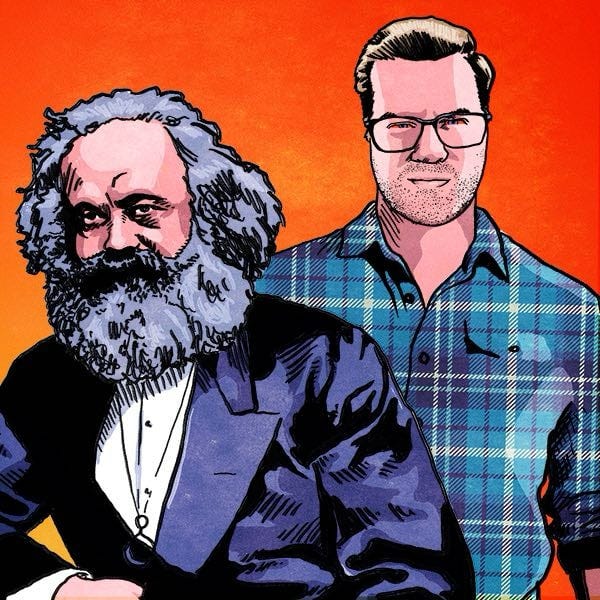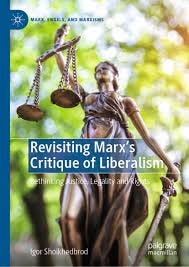Matt McManus on Marx and Liberal Socialism
Some thoughts on the Marx chapter of my friend Matt McManus's new book "The Political Theory of Liberal Socialism."
This is a transcript of my presentation at a panel on Matt McManus’s new book “The Political Theory of Liberal Socialism” at the Historical Materialism conference in London.
Well, the first thing I want to say here is how relieved I am that the program doesn’t list this panel the way I thought it would. When Matt first pitched this event to me, he described it as an “Author Meets Critics” event, and while I did say yes, I was worried this would create misleading expectations or even seem slightly ridiculous for two reasons. The first is that I think Marion and I are a bit implausible as Matt’s critics. She’s actually married to the defendant, and while my own conflict of interest doesn’t run quite as deep, it’s also true that my liver may never recover from my years of friendship with Matt McManus. The second is that, as a matter of ideological inclination, the basic thrust of Matt’s new book is entirely congenial to me. I’ve thought for as long as I’ve been doing this stuff that the socialist project grew out of and required a certain kind of baseline commitment to Enlightenment liberal values and so I regard the kind of work Matt is doing in recovering and thinking through those links as absolutely vital. Some critic I am.
But, I do have at least two friendly amendments to propose. The first is that I sometimes see Matt talking about two groups of people in dialogue with each other, socialists and liberals. That’s certainly how Irving Howe saw things, for example, in his classic 1977 essay in Dissent, “Liberalism and Socialism: Articles of Conciliation,” which Matt approvingly cites in the book. And quite a lot is different depending on how you conceptualize the identity of the second party in that pairing: “the liberals.” If we’re talking about John Rawls and John Stuart Mill, which really means we’re talking about a set of philosophical propositions propounded by John Rawls and John Stuart Mill, then I think the prospects for conciliation are excellent. If we’re talking about “the liberals” as a faction in the politics of the 21st century West, I’d say that we already have entirely too much conciliation already, and we need to be putting forward a far more robustly class-first politics, in self-conscious opposition to “liberalism” in this second sense of the word. I won’t get into that here though, because at the previous event Matt and I did about this at Goldsmiths, I went on about it for so long that I was seriously considering changing the title of my talk to “Why We Fight The Radlib.” So, instead, I’ll focus on the second and far more abstract of my proposed friendly amendments, which is also a better fit for a conference on Marxism, and that’s my reaction to the chapter in Matt’s book about Karl Marx.
Now, I assume every single person in the audience has every page of Matt’s book memorized right? So, I don’t need to do any summary? No? OK. Well, in the chapter, which is quite interesting and often quite theoretically deep, he approaches the complicated question of how Marx thought about liberalism, and through that, how “liberal socialists” should think about Marx. The chapter could almost be called “Liberalism and Marxism: Articles of Conciliation.” His basic approach is to see Marx as a critic of liberalism, to posit that at least some of Marx’s criticisms are just and reasonable and that liberal socialists should take them on board, but also to probe Marx’s work for points where he’s actually open to at least some liberal ideas and where he thus sees a relatively narrow gap between the Marxist and liberal socialist perspectives, and finally, to suggest that in the places where they do diverge we shouldn’t be too quick to assume that Marx is always right. And everything I want to say about all that falls within the broad category of looking for ways to suggest that there’s actually far less of a gap there than Matt suggests, and that Marx himself may be even more of a “liberal” in the sense of that word worth salvaging. And I think maybe you can see then why I see this as a friendly amendment. Because if I’m right, and the most important figure in the history of socialist thought is closer to agreement with the core claims of Matt’s book than Matt thinks he is, then surely so much the better for Matt’s project.
So, as we enter into this question of how liberalism and Marxism relate to each other, we need to ask two really rudimentary questions, which are, “What do we mean by liberalism,” and, “What do we mean by Marxism?” Maybe I’m just being too much of an analytic philosopher about this, but it seems to me that the more clarity we have on these basic definitional issues, the smoother the sailing is likely to be. Well, I’d think liberalism in the positive sense (Kant and Mill-style liberalism, not the liberalism of the libs) is a series of propositions about, perhaps among other things, universal equality in moral status regardless of arbitrary distinctions, combined with a deep suspicion of arbitrary power, with the two combining to give rise to a strong commitment to universal rights, to at the very least, universal rights to some kind of basic civic participation, and universal negative rights like free speech and freedom of religion, with plenty of conceptual resources in at least the branches of the tradition with which Matt is most engaged to ground wide-ranging universal positive rights to not just have healthcare and public schooling and the like but a long-term horizon of at least rough material equality and rough equality of economic power. While “Marxism” is also a pretty damn considerably contested concept, I think the main thing it means is Marx’s theory of—wait for it—historical materialism, of how and why modes of production rise and fall over the course of history, of how they give rise to legal and political superstructure, of how they establish at least the basic parameters of what goes on in all sorts of other areas of philosophy—that’s your social being determining social consciousness rather than the other way around—and how those modes of production work in their own internal dynamics, and most particularly how the capitalist mode of production works in its own internal dynamics, which is of course the part of the whole package to which Marx devoted by far the lion’s share of his intellectual labors. And if the judges will accept those two descriptions, of Marxism and of liberalism, as at least broadly accurate, the first and most basic point I want to make is that there’s a clear sense in which not only do they not contradict one another but that, in principle, they couldn’t contradict each other, because of Hume’s Law, which is the principle of logic that empirical claims can’t entail any normative claim (or the negation of any normative claim) all by themselves. Empirical premises can be and often are premises of moral arguments, but you need to have empirical premises in the mix. And the other way around is perhaps even more obvious. If you’re rejecting factual claims because you find them inconvenient for your normative hopes and dreams, you’re doing it wrong.
And in a certain sense I could stop there—see, no conflict!—but I’d like to go a bit further, for two reasons. First, the Humean point renders Marxism compatible with liberal values, but it also renders it compatible with conservative values or fascist values or any other set of values you’d like. As realistically unlikely as this may be, in principle, you could imagine an intellectually convinced historical materialist who completely believed in an orthodox version of Marx’s theory of history via Engels, Kautsky, and G.A. Cohen, who accepted that humanity’s choices were socialism or barbarism, but who was so attached to some demented Nietzschean value system that, given those options, he simply chose barbarism. So, this might not be a particularly interesting way to pursue the conciliation.
Instead, we can start by noticing that, however strictly logically coherent the combination I just described may be, realistically, no one would bother with Marxist theory if they didn’t have normative socialist goals. To whatever extent Engels was onto something when he called Marxism “scientific socialism,” this is an engineering science. We’re trying to understand how capitalism got here and how it works, so we can understand how to get past it. Just as you wouldn’t bother with medical science if you didn’t care whether patients lived or died, whether they were hobbled by painful illnesses or whether they were able to live active and physically flourishing lives, you wouldn’t bother with historical materialism if you didn’t care about creating a more equal society, free from domination and exploitation, and Marx himself most definitely cared about that. And this brings me to the second point, which is where we’ll stay for the time I have left, which is that if we use the term “Marxism” more loosely, to describe the totality of Marx’s views, including his occasionally explicit but usually implicit normative views—in the chapter, Matt gives us the famous G.A. Cohen quote about Marxists devoting “their intellectual energy to the hard factual carapace surrounding their values” and rarely exploring the values themselves—then the question of how close or far Marxism in that sense is from Matt’s kind of liberal socialism becomes a lot more interesting.
To narrow the gap between the two, Matt cites Igor Shoikhedbrod’s Revisiting Marx’s Critique of Liberalism, where Shoikhedbrod cites extensive evidence of Marx’s lifelong commitment to liberal political goals such as universal suffrage, freedom of speech—in fact, some of Marx’s formative political writings were about the struggle against censorship—and so on. Matt quotes the bit in the Communist Manifesto calling for a “centralization” of factories, farms, and credit “in the hands of the state” and postulates this as a kind of pro-Leninist vanguardism. In fact, he repeatedly describes it with the phrase “democratic centralism,” which I don’t find quite convincing. (It seems to me that, just as British democracy wasn’t degraded by the centralization of healthcare and coal mining into government hands in the Attlee years, state planning can in fact be combined with meaningful civic participation and protections of liberal rights even if it wasn’t so combined in the Soviet Union, perhaps we can get into that in the Q & A.) He does cite Marx’s book on the Paris Commune, The Civil War in France, for evidence of Marx having a less “democratic centralist” and hence more actually liberal-democratic, conception of a post-revolutionary state later in his life.
In fact, Matt seems to think at one point Marx bent the stick too far in favor of hyper-democracy, praising the Communards for making every elected official recallable by their constituents for any time and any reason, which Matt suggests would be too chaotic but which strikes me as actually a quite reasonable compromise between the limits of representative democracy and the obvious downsides of making democracy so direct we’d all have to spend our lives in meetings.
I’d also point out that the early soviets of workers’ and soldiers’ deputies in the Russian Revolution had precisely this feature, and the Bolshevik suppression of that democratic accountability can be reasonably seen as the beginning of the wrong turn. He also praises Marx for at least implicitly approving of freedom of religion in his writings on the Commune, which he seems slightly surprised by—he says “even” freedom of religion—but I’d point out that this is a lifelong commitment of Marx’s. Even On the Jewish Question, where Marx says several things about Jews and Judaism I wouldn’t repeat when I see my relatives next month for Hannukah, a big part of what he’s doing is defending religious Jews’ freedom of religion against Bruno Bauer’s insistence that Jews must give up their religious particularity to join a unified secular state, with Marx saying no no no, actually freedom of religion is a basic necessity, before he goes into the better remembered parts about how liberal rights are insufficient for a deeper emancipation, and then indulges in some deeply unfortunate metaphors at the end. In the discussion of the Civil War in France, Matt says that Marx’s “support for a highly democratic and accountable political system characterized by minimal domination” is “praiseworthy but largely sidesteps correct liberal worries about the need to divide power between different bodies to avoid its dangerous concentration in a few hands.”
He also cites the bit in the Critique of the Gotha Program about how the earlier phase of a communist society will need to be “stamped with” what it inherits from bourgeois society, which Matt takes as evidence for liberal rights being protected, at least in an earlier or transitional phase before the withering away of the state makes it all a moot point.
And…well…maybe, and not to belabor this part too much, it was extensively discussed in the Q & A at Matt’s previous talk here a few days ago that I know some of you were at, but in context, Marx is using the stamping metaphor to talk about how consumption will still have to be tied to labor contributions in the earlier phase of communism before super-abundance makes it a moot point. I think there is something there in that discussion that’s promising for uncovering Marx’s commitment to certain liberal values, but I’d locate that slightly differently. A lot of superficial readers of the Critique of the Gotha Program see Marx criticizing Lassealean slogans about equal compensation for labor and saying, aha, Marx doesn’t care about equality as a value, but that’s...just obviously wrong if you know literally anything about the philosophical literature about egalitarianism.
In fact, a lot of Marx’s objections to those slogans come from precisely the sort of considerations later raised by various liberal egalitarian philosophers in late 20th century debates about “equality of what?”—should we be aiming for absolute equality of resources, or equal access to advantage, or equal flourishing, or….or…. Like, if the medical system devotes fewer resources to me than a parapleigic, that’s not objectionably inegalitarian, because I need less medical attention in order to live a happy and flourishing life. I think a more promising place to go looking for Marx being a liberal, or at least conjecturally making use of liberal principles, comes in Capital—not in the first three chapters, every sentence of which has been parsed through with a kind of talmudic attention to granular details that often has diminishing returns, or in the exciting reader-favorite chapters about the enclosures or the working day, but in the insufficiently loved Chapter 15 on machinery, where Marx acknowledges the need for a certain kind of cohesion (with everyone doing what they’re supposed to at any given time) as a purely technical requirement of the use of machinery, but then also writes:
In the factory code, the capitalist formulates his autocratic power over his workers like a private legislator, and purely as an emanation of his own will, unaccompanied by either that division of responsibility otherwise so much approved of by the bourgeoise, or the still more approved representative system. The code is merely the capitalist caricature of the social regulation of the labor process which becomes necessary in co-operation on a large scale and in the employment in common of instruments of labor, and especially of a machinery.
In other words, yes, what goes on on the factory floor can’t be an anarchistic free-for-all for purely technical resources, but it doesn’t need to be the despotism of capitalist private legislators either. And to explain why that despotism is bad, he brings up not only the lack of representative democracy—this is the basic Richard Wolff point about democracy at work—but also the lack of separation of powers stopping any one individual from exercising too much power. And sure, you can read all this to a point as just immanent critique, throwing the bourgeoise’s own professed values back in their faces without necessarily endorsing them. Like, see, when these people are being ruled over in the political sphere, they approve of division of responsibility and still more approve of parliamentary democracy. Isn’t it interesting, though, that all that goes out the fucking window when we enter the gates of the factory and see that Dante-style sign Marx invokes earlier in Capital, the one that says, No admittance except on business? And to a point, that’s a plausible reading. But, I’d also point out that Marx himself pretty clearly thinks factory despotism is bad, and that appeals to these libreral principles shed some light on why it’s bad. So, again, the gap may be even narrower than Matt thinks. And more generally, whenever Marx speaks disparagingly of chartered rights and freedom and so on, it’s never to suggest that these liberal advances have gone too far, but always to suggest a troubling disconnect between those political achievements and what goes on at the economic base of society. If he’s dripping irony about the market as the “very Eden of the rights of man,” that strikes me as irony more at the expense of the market than at the expense of the rights of man.
All of which is just to say, Matt, my good friend, you’re not wrong to think that liberal principles and the socialist project have a deep affinity we need to recover, and you’re not wrong to think the most important figure in socialist history isn’t nearly as much of a critic of liberalism as he’s often taken to be. But I think you may be understating the degree to which he’s a friend.






